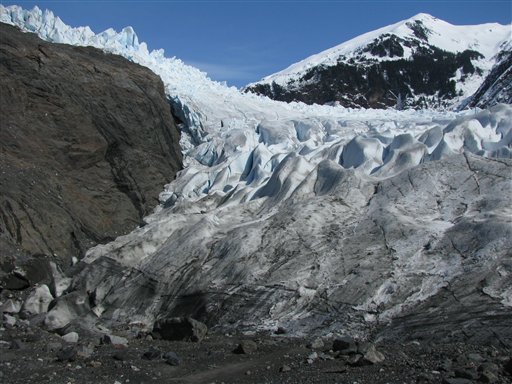Study blames humans for most of melting glaciers

This April 19, 2013, file photo shows the Mendenhall Glaicer where it spills over the mountains above Mendenhall Lake in Juneau, Alaska. More than two-thirds of the recent rapid melting of the world’s glaciers can be blamed on humans, a new study finds. AP
WASHINGTON — More than two-thirds of the recent rapid melting of the world’s glaciers can be blamed on humans, a new study has found.
Scientists looking at glacier melt since 1851 didn’t see a human fingerprint until about the middle of the 20th century. Even then only one-quarter of the warming wasn’t from natural causes.
But since 1991, about 69 percent of the rapidly increasing melt was man-made, said Ben Marzeion, a climate scientist at the University of Innsbruck in Austria.
“Glaciers are really shrinking rapidly now,” he said. “I think it’s fair to say most of it is man-made.”
Scientists fault global warming from the burning of coal, oil and gas as well as changes in land use near glaciers and soot pollution. Glaciers in Alaska and the Alps in general have more human-caused melting than the global average, Marzeion said.
Article continues after this advertisementThe study is published Thursday in the journal Science.
Article continues after this advertisementThe research is the first to calculate just how much of the glacial melting can be attributed to people and “the jump from about a quarter to roughly 70 percent of total glacier mass loss is significant and concerning,” said University of Alaska Fairbanks geophysicist Regine Hock, who wasn’t part of the study.
Over the last two decades, about 295 billion tons (269 billion metric tons) of ice is melting each year on average due to human causes and about 130 billion tons (121 million metric tons) a year are melting because of natural causes, Marzeion calculated.
Glaciers alone add to about four-tenths of an inch of sea level rise every decade, along with even bigger increases from melting ice sheets — which are different than glaciers — and the expansion of water with warmer temperatures.
Marzeion and colleagues ran multiple computer simulations to see how much melting there would be from all causes and then did it again to see how much melting there would be if only natural causes were included. The difference is what was caused by humans.
Scientists aren’t quite certain what natural causes started glaciers shrinking after the end of the Little Ice Age in the middle of the 19th century, but do know what are human-causes: climate change, soot, and local changes in land use.
There is a sizable margin of error so the 69 percent human caused can be as low as 45 percent or as high as 93 percent, but likely in the middle.
“This study makes perfect sense,” said Pennsylvania State University glacier expert Richard Alley, who wasn’t part of the research. “The authors have quantified what I believe most scientists would have expected.”
Not all of the human-caused melting is from global warming from the burning of fossil fuels, but climate change is the biggest factor, said Ted Scambos, a scientist at the National Snow and Ice Data Center.
The study showed that it took time for global warming and other factors to build up and cause melting. That lag effect means the world is already locked into more rapid melting from the warming that has already occurred, Marzeion and Alley said.